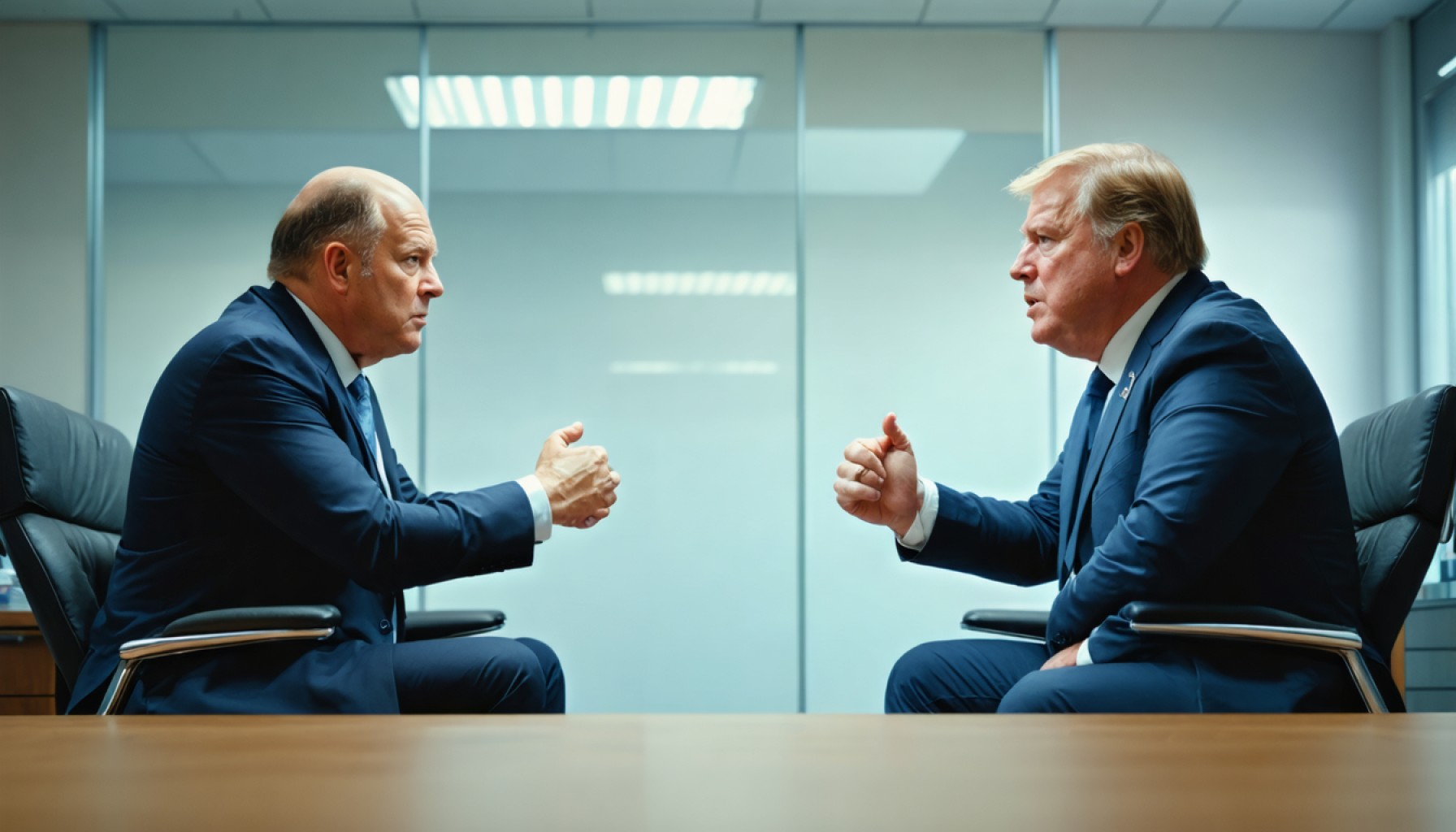- Friedrich Merz and Olaf Scholz are the main contenders in a pivotal German political contest, showcasing contrasting personas and backgrounds.
- Merz, a candidate with a history in both politics and private business, blends impatience with a new sense of stateliness, creating a narrative of comeback and innovation.
- Scholz, an experienced politician, sheds his former reserved image to reveal a bolder character, evolving from a quiet figure to a commanding presence.
- The film captures their dynamic campaigns, highlighting Merz’s fresh approach and Scholz’s strategic repositioning, set against their distinct career trajectories.
- The central question remains whether Merz can maintain his lead or if Scholz’s transformation will sway the electorate, as Germany eagerly anticipates the results.
A political contest unfolds in Germany, where two strikingly different men vie for leadership. On one side stands Friedrich Merz, the Union’s carefully chosen candidate, a figure shrouded in contradictions, blending impatience with a newfound stateliness. Meanwhile, Olaf Scholz emerges from the shadows, revealing an unexpectedly bolder persona, contrasting his typical reserved nature.
As the camera follows these protagonists, it captures the dynamic shifts during their campaign. Merz, having spent years away from frontline politics in business circles, brings a fresh, though sometimes contentious, approach to his campaign. His past as a leading Bundestag figure and the drama of his fall and rise add a compelling narrative to his journey.
Scholz, with his extensive political pedigree that spans several governments and as Hamburg’s former mayor, grapples with the legacy of his often tumultuous chancellorship. The film unveils his evolution—from a muted politician to one who now wields words like steel—an astonishing transformation.
The juxtaposition of their careers reflects a broader contrast; one man commands respect from decades within the political system, while the other brings a perspective shaped by years of private sector experience. The film peels back layers to explore what drives these candidates, capturing intimate moments of tension and strategy, culminating in the eventful march toward election day.
The ultimate question lingers—can Merz hold his lead and avoid a repeat of past electoral disasters, or will Scholz surprise Germany by capitalizing on his newfound fortitude? As the day of decision draws near, the nation waits, captivated by the spectacle of power and possibility.
Germany’s Political Face-Off: Merz vs. Scholz – Who Will Lead?
How-To Steps & Life Hacks: Navigating Political Campaigns
1. Crafting Your Message: A successful campaign begins with a clear and consistent message. Both Merz and Scholz have tailored their messages to align with their strengths—Merz focusing on economic expertise and Scholz on political stability.
2. Leveraging Past Experiences: Identify key moments from your past that resonate with voters. Merz’s business acumen and Scholz’s political experience serve as critical credentials.
3. Building a Diverse Team: Assemble a team that brings different perspectives, just as both candidates have captured the spirit of their respective parties: conservative values for Merz and progressive policies for Scholz.
4. Engaging with Voters: Utilize social media and town halls to directly communicate with constituents, echoing the innovative campaign strategies both candidates have used.
Real-World Use Cases
– Merz’s Economic Proposals: His business background allows for economic policies that resonate with German entrepreneurs and the private sector.
– Scholz’s Leadership in Crisis: Scholz’s performance during key crises, such as the COVID-19 pandemic, showcases robust decision-making critical for leadership.
Market Forecasts & Industry Trends
With the global political landscape changing, Germany’s leadership impacts the European market heavily. Scholz’s tenure hints at stable continuity, potentially favoring international investments, while Merz might push for more market liberalization.
Reviews & Comparisons
– Expert Opinion: Political analysts note Merz’s fresh vision aligns with corporate reform, while Scholz’s experience suggests a steady hand in governance.
– Public Sentiment: Polls show Merz leading initially but Scholz catching up as debates highlight his newfound assertiveness.
Controversies & Limitations
– Merz’s Corporate Ties: Critics argue potential conflicts of interest due to his corporate connections.
– Scholz’s Past Leadership: Skeptics highlight Scholz’s challenge in overcoming past criticisms of his chancellorship.
Features, Specs & Pricing (Political Platform Details)
– Merz’s Platform: Advocates for tax cuts and deregulation, emphasizing economic growth.
– Scholz’s Platform: Focuses on social welfare, climate policies, and EU integration.
Security & Sustainability
– Energy Policies: Both candidates prioritize renewable energy; however, their methods differ significantly in implementation speed and scale.
– Digital Security: Merz calls for increased cybersecurity measures, reflecting his corporate background, while Scholz advocates for EU-wide initiatives.
Insights & Predictions
– Election Outcome: Analysts predict a tight race, with potential coalition negotiations post-election.
– Long-Term Impact: Merz might shift Germany towards a more business-friendly environment, while Scholz could maintain its strong social policies.
Tutorials & Compatibility
– Getting Involved: For those interested in German politics, following debates on platforms like ARD and ZDF can provide insights.
– Compatibility with EU Directions: Scholz’s policies align closely with current EU trends, while Merz might push for more autonomous German policies.
Pros & Cons Overview
Friedrich Merz
– Pros: Economic expertise, business-friendly.
– Cons: Potential corporate bias, less political experience recently.
Olaf Scholz
– Pros: Experienced leader, crisis management.
– Cons: Past controversial decisions, perceived lack of dynamism previously.
Conclusion & Recommendations
As Germany gears up for this decisive election, voters should consider:
– Evaluating the economic versus social policy impacts.
– Understanding the potential changes each candidate might bring internationally.
– Engaging in political discussions to refine your choice based on both candidates’ visions for Germany.
Stay informed with up-to-date news through reliable outlets like DW and Spiegel.
Quick Tip: Attend local political meetings or discussions to gain a grassroots perspective on how national policies affect your community.
